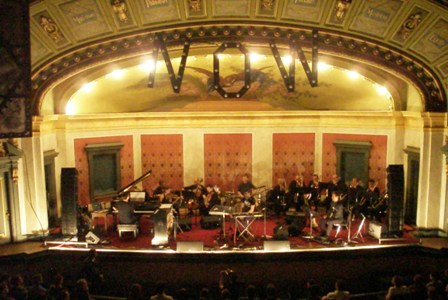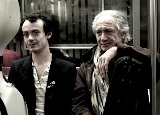
|
Part 3. Earth to the Moon and Beyond.
The final night of MusicNOW 2012 at Memorial Hall in Cincinnati had both earthly and otherworldly aspects. The opening acts, flamenco guitarist Pedro Soler and his son, cellist Gaspar Claus, and the folk band "This is the Kit" provided a rich grounding in music of, by and for earthlings. Looking heavenward, an ensemble of Cincinnati musicians joined forces with Nico Muhly, Bryce Dessner and Sufjan Stevens in a workshop presentation of their new collaborative song cycle "The Planetarium."
The heavens added their own voice, too, as a brief thunderstorm blew threw the area, cooling the temperature in the hall to help make it more comfortable for the packed-in crowd.

Gaspar Claus (left) and Pedro Soler
|
"This is the Kit," an ensemble of voice, guitars, banjo, drums and keyboard led by Kate Staples, followed the first intermission. British-born Staples' soft, sweet voice lulled the crowd. Their selections included "Two Wooden Spoons," one of their most popular singles, where Stables crooned to her own soft plucking on the guitar.
Muhly, Dessner and Stevens introduced their song cycle with a band comprising string quartet -- violinists Tatiana Berman and Joshua Ulrich, violist Stephen Goist and cellist Nathan Chaitkin -- seven trombones -- Ben Lightner, Kevin Graber, Michael Ritchie, Timothy Anderson, Nathan Siler, Ben Clymer and Adam Chapman of the Trombone Choir of the University of Cincinnati College-Conservatory of Music -- and James McAlister on drums and percussion. It was an arresting array, with vocals by Stevens, Muhly on piano and keyboards and Dessner on guitar.
It was a more or less informal presentation, with banter among the musicians and off-the-cuff comments to the crowd. But the music-making was spectacular, perfused with color and gesture and keyed to its celestial theme. There were solemnity and grandeur in "Neptune" and an inevitable allusion to "The Sugar Plum Fairy" (Tchaikovsky's "Nutcracker") in "Jupiter," with Muhly playing celeste. "Venus" was both delicate and heavy (even menacing), with everything from string trills to blasts of trombone. There were some rough "industrial" sounds in "Mars" and a touch of jazz, which with cross rhythms and a persistent upbeat by the trombones, grew almost cacophonous. "After all the devastation, will we see light?" sang Stevens. The answer was desolate and inconclusive. "Pluto" ("the underdog") featured Dessner on mandolin.
"The Moon" was an instrumental. Pizzicato and bowed strings, celeste and staggered entrances by the trombones over a steady drum beat gave it a generally broken, prickly sound. "Earth," by contrast, was poignant. There were solemn, repetitive figures by the strings (recalling Philip Glass, of whom Muhly is a protege) and Dessner's bowed bass guitar yielded a big hollow sound. The final destination, "Mercury," was highly energetic, with Glassian syncopation and a big trombone solo. Taken together, it made a big tread for a small planet.
Response to "Planetarium" was enthusiastic, with whistles, cheers and a unanimous standing ovation. No one seemed to notice that almost three-and-one-half hours had passed.